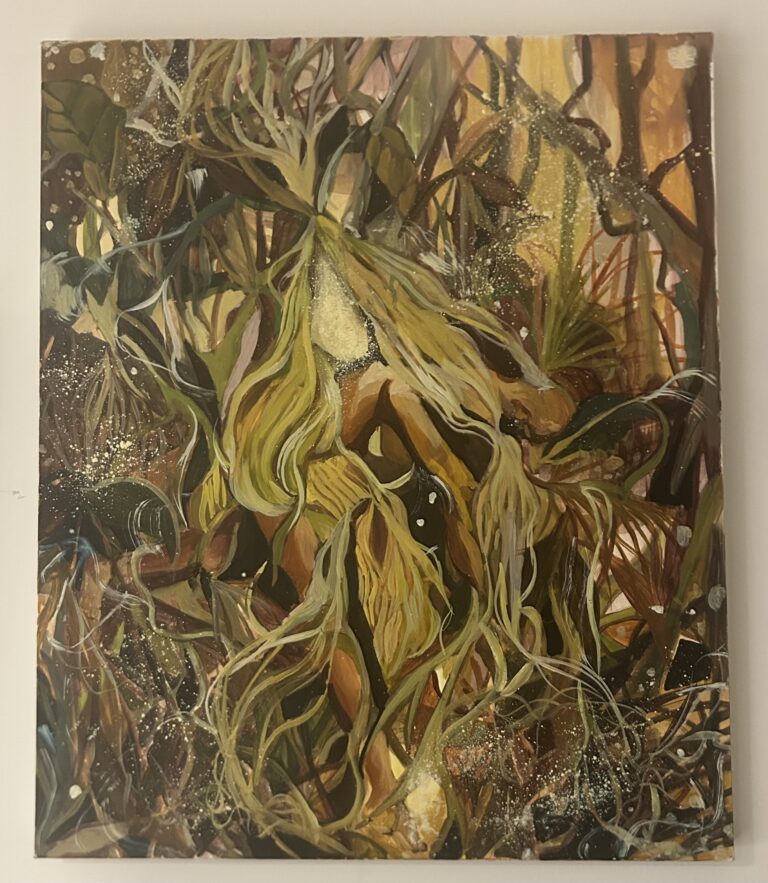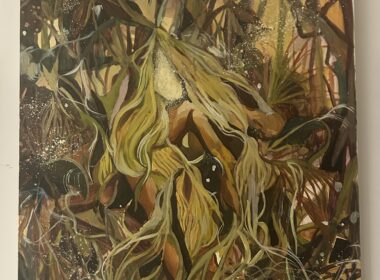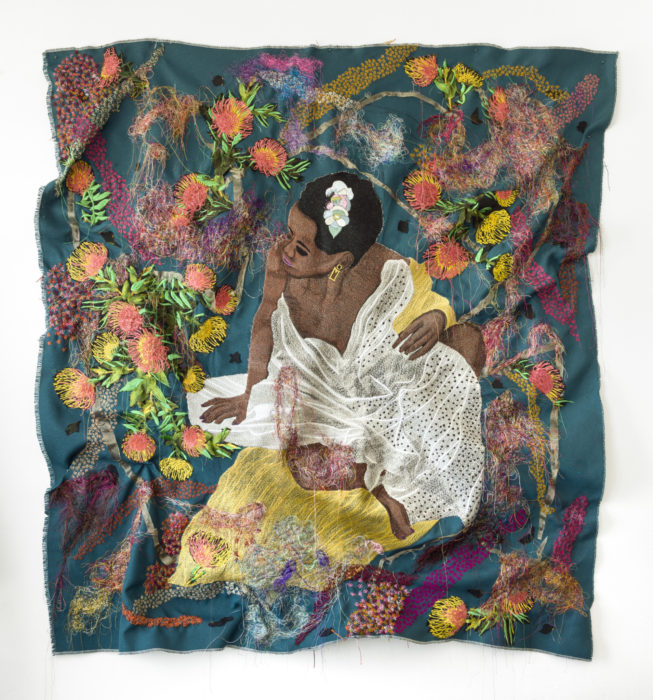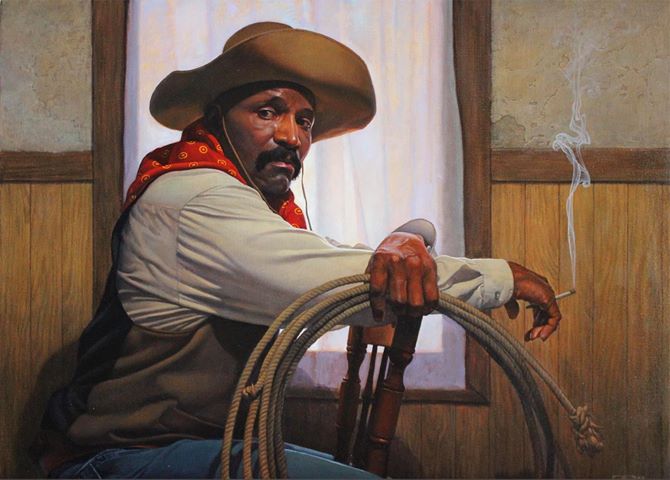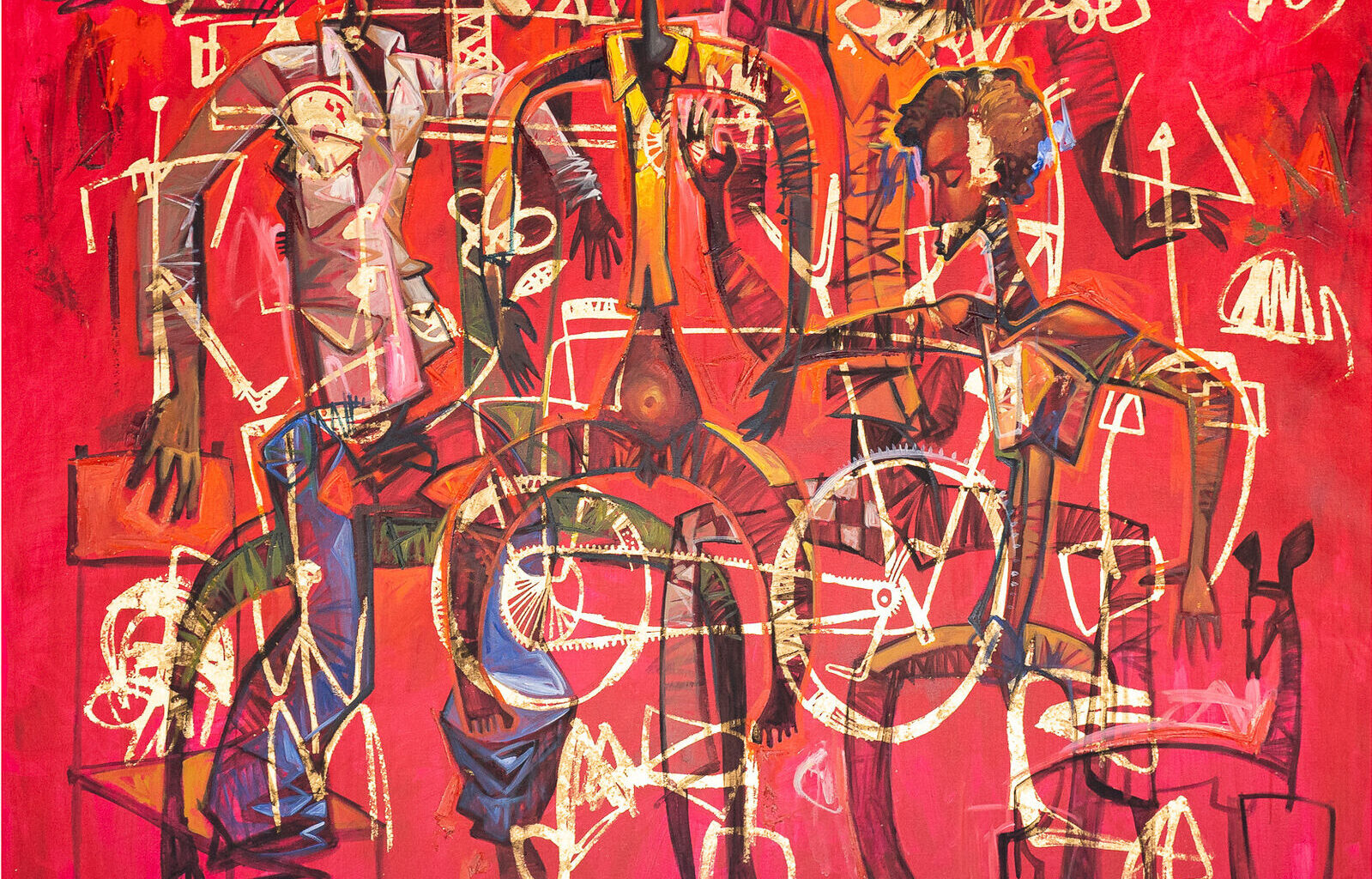This week in African art and culture, a distinct exhibition comprised of Black female textile artists is on view in New York. In Dakar, Senegal, an art space commemorates its reopening with restituted arts from the West. A longtime practicing sculptor from South Africa wins an award, a celebrated African singer is on a winning streak, and a writer becomes a literary laureate in Tunisia. In recurring news about film adaptation of literary books, one of Africa’s most phenomenal classic series goes to screen.
1-54 New York Showcases an All-Female Exhibition on Textile Art
Following successful presentations in their collaborations with Christie’s for the Paris and London editions, which was born as a means to safely organize a fair during the pandemic, 1-54 Contemporary African Art continues the partnership for a hybrid presentation of the New York edition currently taking place. This edition features 26 international galleries and about 100 participating artists, and will be presented as an online exhibition.
For the physical exhibition however, the fair has explored a unique presentation of only female artists working with textiles. Installed at Christie’s Rockefeller Plaza in New York, the exhibition, which is titled Knotted Ties, explores the multiplicities of the medium and narratives portrayed and expressed through fabric and thread.
The artists exhibiting in Knotted Ties are Ambrose, Igi Lola Ayedun, Joana Choumali, Lidia Lisbôa, Kimathi Mafafo, Turiya Magadlela, Dindga McCannon, Shervone Neckles, Josie Love Roebuck and Tina Williams Brewer.
Emphasizing the strength of textile work and its capacity to convey humanity’s entangled histories, the selected works challenge social landscapes and complex realities. To buttress this, Kimathi Mafafo captures how she started exploring textile as a medium:
“I started with embroidery from wanting to duplicate my original paintings into embroidery. I can also trace back that my late great-grandmother was an embroider in tapestry who used to decorate her tapestry in a beautiful house. So basically, I got the skill from my late great-grandmother.”
Knotted Ties will remain open to the public until May 26, 2021.
Theodore Monod Museum Reopening Celebrates Art “Back on African Soil”
The Theodore Monod Museum of African Art (Musée Théodore Monod d’Art africain) in Dakar, Senegal reopened this week after having to close its doors for over a year due to the pandemic. For its reopening exhibition, restituted artworks have been added to the museum’s collection for public access.
Built in the early 1930s, the building housed the French Institute for Black Africa, which later was renamed as Fundamental Institute for Black Africa (IFAN), and then formally made a museum in 1960 and named for French scientist and explorer Theodore Monod in 2007.
The current exhibition celebrates Senegalese figure Amadou-Mahtar Mbow, the first African director of UNESCO, who turned 100 years old on Thursday.
In a statement on the museum reopening, Curator, El Hadji Malick Ndiaye described the collection at the Theodore Monod Museum “unparalleled in Africa.” Some of the works were acquired in the 19th century, with IFAN researchers later adding art they collected in the context of their studies: figurines, masks, vessels, cloth, ornamental or live weapons of wood, metal, earth or leather, mainly from West Africa or the Sahel.
Recently arrived from Paris are several works that had been on loan for years to the Quai Branly museum.
“It isn’t a restitution, it’s a return,” explained Ndiaye, “But still, the symbolism is there: these are objects that have returned to African soil.”
At the entrance of the exhibit is an installation made from crates in which artworks are transported—”the symbol of the crossing,” said Ndiaye. Nearby, a megalith is on display that not so long ago graced the halls of New York’s Metropolitan Museum of Art. A portrait of Mbow celebrating his centenary hangs in the middle of the exhibit, and his appeal is prominently featured.
With improvements made to the lighting system of the space, direct sunlight, which once glared in from openings, now is diffused to make detail on the works more visible. Work on the exhibit carried on until just hours before the public was admitted. In the quest for post-pandemic normalcy, Ndiaye said of the Theodore Monod Museum that it is “the admiral ship that symbolizes the return.”

South African Poet and Sculptor Pitika Ntuli Wins Global Fine Art Award in Paris
South African sculptor, poet and writer Pitika Ntuli has been announced winner of the seventh edition of the Global Fine Arts Awards. He was selected the winner from among 116 nominees.
Judy Holm, Global Fine Art Awards founder and president, said that this year’s awardees represent five continents and 18 countries following the year-long research process to discover the best-curated art and design exhibitions and independent projects around the world.
After extensively researching more than 2,000 curated exhibitions and installations across the globe, Ntuli’s Azibuyele Emasisweni (Return to the Source), an online exhibition of the bone sculptures presented by the Melrose Gallery, won the “You-2 Award,” one of the two People’s Choice Awards.
Ntuli has spent most of his life in the service of liberating his country, so the award comes as pleasing news, seeing his work placing South African art firmly on a scale of global recognition. He had hoped African art would become more and more prominent and appreciated.
In her speech, Holm recognized the significance of the newly launched category in which the exhibition was nominated—Best Digital Exhibition or Online Educational Program. She spoke about the significance of finding new ways of communicating art in the time of COVID-19. She also gave special mention to the underlying spiritual and political meaning of the works.
Each bone sculpture was accompanied by a poem, and 33 collaborators, including Homi Bhabha, Ngugi Wa’Thiongo and South Africa’s Minister of International Relations Naledi Pandor, contributed poems, reflections and theoretical analysis.
Burna Boy Makes History as the First African Artist to Hit 100 Million Streams on Spotify
Burna Boy is again at the fore of recognition for another groundbreaking record. The
Grammy-Award-winning artist has become the most sought-after artist after three of his albums reportedly reached over 100 million streams each on Spotify.
Chart Data, an independent online platform that analyzes digital music statistics from around the world announced the amazing news in a tweet. According to Face to Face Africa, Burna Boy now has over 100 million streams for each album on Spotify, making him the most in-demand Afrobeats artist.
The 2020 album Twice as Tall earned Burna Boy a Grammy in the “Best Global Music” category. Minutes before being announced a winner, Burna Boy put on a rip-roaring performance in spite of the pandemic. This specific win was major for Burna Boy after he previously had been nominated in 2020, when the Benin Republic iconic singer Angelique Kidjo, who was nominated alongside Burna, won.
Tunisia’s Amine Al Ghozzi Is European Union Prize for Literature 2021 Laureate
On May 18, 2021, Amine Al Ghozzi’s Zindali The Night of 14 January 2011 was announced laureate of the European Union Prize for Literature 2021.
The European Union Prize for Literature recognizes emerging fiction writers from the European Union and beyond. Engaging the 41 countries represented in the Creative Europe program of the European Union, the prize recognizes 41 outstanding new literary talents across a cycle of three years. Highlighting the creativity and the immensely diverse wealth of Europe’s contemporary literature in the field of fiction, it aims to promote the circulation of literature within Europe and to encourage greater interest in non-national literary works.
The 2021 edition awarded 13 laureates from the countries participating in this cycle, including Tunisia. Tunisia’s four-member jury was chaired by Raja Ben Slama, professor at the University of Manouba, psychoanalyst, director-general of the National Library of Tunisia, and included Kamel Gaha, professor emeritus of French literature, member of the Beit-al-Hikma Academy; Jalel El-Gharbi, professor of literature at the University of La Manouba; and Adam Fethi, writer, president of PEN Tunisia.
In April, three Tunisians were revealed to be shortlisted for the country’s award: Béchir Garbouj, Saber Mansouri and Amine Al Ghozzi. From these, Al Ghozzi’s Zindali The Night of 14 January 2011 (Editions Zayneb) was announced to be the winner.
Mariya Gabriel, the European Commissioner for Innovation, Research, Culture, Education and Youth congratulated the winning laureates. Commissioner Gabriel said, “The E.U. Prize for Literature celebrates and promotes the incredible creativity and diversity that can be found in Europe’s contemporary literature scene. The immense value of literature is more apparent now than ever before. Having lived under the shadow of COVID for more than a year, books have become ‘essential.’ Congratulations to the laureates!”
Responding to his win, Amine Al Ghozzi wrote in a tweet, “Glad to represent #laTunisie in the winners #EUPL2021. Thank you @europe_creative and Europe creative Tunisia for this great initiative.”

Chinua Achebe’s Classics to Become TV Series!
Chinua Achebe’s African classic trilogy—Things Fall Apart, No Longer at Ease and Arrow of God—are being adapted for the screen, according to a statement by Achebe’s family.
The family will work with consultants Dayo Ogunyemi of 234 Media and Joe Seldner of Seldner Media to bring the novels to the screen.
“A television series combines the visual appeal of film with the ability to tell stories over extended programming,” the statement further reads. “This makes it possible to faithfully present the African trilogy’s epic, multi-generational sweep on screen to a global audience for the first time. The series will portray decades of wrenching social change, from the end of the 19th century in Things Fall Apart through the emerging 20th century in Arrow of God and the mid-20th pre-independence century in No Longer at Ease.”
Considered one of the world’s greatest novels ever written, Achebe’s Things Fall Apart has had a phenomenal impact in the history of African literature. The novel has since sold tens of millions of copies and has been translated into more than 60 languages. The follow-up novels that complete the trilogy also have been met with critical acclaim.
“We believe this moment makes the message of my husband’s work urgent, especially for Millennials and Generation Z who are challenging systemic racism and driving the new civil rights movement,” Christie Achebe, the wife of the late literary giant, said. “Chinua Achebe’s recognition and centering of these issues from an African perspective make his stories more vital than ever.”
Similarly, Chidi Chike Achebe, the son of the late novelist, shared more. According to him, the project team is made of top Hollywood geniuses and Asians as well. Date for the official release is still unknown.
–Compiled by Roli O’tsemaye
